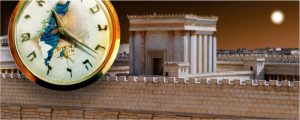Entering a new year is always special. In a way, it gives us a new start, a feeling that it’s possible to leave something behind. According to the Jewish calendar, in the month of September we will enter the year תשע”ו, or 5776.
Almost every date noted in  Israel will have two entries,
Israel will have two entries,
one beside the other: one according to the Jewish calendar (5776), and the other according to the Gregorian calendar (2015–2016). The first calendar counts the years since Adam and the creation of the world, and the second counts the years since the birth of the Messiah, Yeshua/Jesus.
During the first century, in the time of Jesus, another calendar existed as well. The calendar used today in Israel was the most common calendar in the first century, and this calendar follows the cycles of the moon. The other calendar in use was a solar calendar. This means that the Jewish holidays did not fall on the same day of the week on the two calendars. The lunar calendar was used in the temple in Jerusalem. The Essenes, who lived by the northern part of the Dead Sea, in Qumran, distanced themselves from the lunar calendar and instead followed the solar calendar.
According to this old solar calendar,
the year numbered 364 full days, and consequently consisted of exactly 52 weeks. The New Year, like every holiday, would, according to this calendar, always fall on a different day than it did on the lunar calendar, and Passover would always fall on a Wednesday, and thus start on Tuesday night. In the Dead Sea Scrolls, we can read the complaints of the Qumran community about priests from the temple in Jerusalem coming down to Qumran and disturbing the community on their Yom Kippur (Day of Atonement), when to the  priests following the lunar calendar it was an ordinary day.
priests following the lunar calendar it was an ordinary day.
It was the lunar calendar which prevailed, and this calendar is still the official calendar of the State of Israel today. But the
fact that two different calendars existed in the first century might help us to resolve a discrepancy among the Gospels: Was the Last Supper that Jesus celebrated with his disciples a Pesach/Passover meal or not? For centuries, scholars have disagreed on this issue because of the difference between the Synoptic Gospels (Matthew, Mark, and Luke) and the Gospel of John. According to John, Jesus died when the Passover lambs were slaughtered in the temple, but according to the Synoptic Gospels, Jesus ate a Passover meal with his disciples before he died. Many scholars used to claim that we have to choose between the two possibilities. Maybe the solution to this discrepancy is that the Gospel of John was written based on one calendar (the official lunar calendar used in the temple), and the synoptic writers were following the solar calendar.
Those of us living in Israel will celebrate the next New Year in September, according to the official Jewish lunar calendar. The Caspari staff wishes all our readers and supporters a Happy New Year 5776 from Jerusalem.
Elisabeth E. Levy